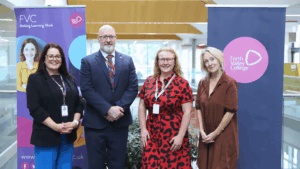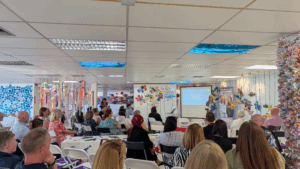Published in the Scottish Journal of Residential Child Care Vol 18 No 2
Abstract
Scottish mentoring charity MCR Pathways’ founder reflects on the transformational impact relationships and mentoring is having on Scottish care-experienced young people, mentors and organisations in Glasgow and other local authorities in Scotland. Using pioneering embedded partnerships with local authorities and schools, the MCR model is aiming for long term system and culture change to the education system. While focused on the Scottish system, the author took his original motivation from five years of working in the residential care system in England and increasingly from witnessing the same issues in other western countries. The article explores the challenges preventing policy makers from creating a consistent impact on the educational outcome of Scotland’s most disadvantaged young people relative to their peers. With young people leading the debate, it proposes simple changes to Scottish corporate parenting and widening access policies and practices, based on statistical evidence and 12 years of powerful stories.
Corresponding author:
Iain MacRitchie, Founder, CEO & Chair, MCR Pathways,
Mitchell Library, Berkeley Street, Glasgow, UK G3 7DN
iain.macritchie@mcrpathways.org
Acknowledgements
I would like to thank Dana Vreeswijk for writing, editing and research support, the broader MCR Pathways team for their dedication and commitment to our nation’s young people, our partner schools, organisations and mentors for their support, and most importantly our young people for inspiring us every day. Lastly thank you to my mentee who is now much more of a mentor. I am amazed at how much she has overcome to now be a successful medical student and someone I have no doubt will change the world.
MCR Pathways’ relationship based practice at scale: Revolutionising educational outcomes for care-experienced young people
Introduction
When I first committed to tackling the staggering education outcome and life-chance disparity between Scottish care-experienced young people and their peers, I was told one thing: The plan would not work. The problem was too big and too complex to fix. On this fact, the doubters were correct – for decades the injustice was and still is substantial. I had seen the same issues at first hand while working in the English care system and believe it is mirrored in many western countries.
The harsh reality of being disadvantaged from birth
According to government reports, in 2017 only 28%, or just over one in four, care-experienced pupils (students) (Scottish Government (2018a) stayed on in school beyond the age 16 compared to the 88.4% universal rate for pupils in Scotland (Scottish Government, 2018b). Between 2015-2018, nationally only 35% of S5 care-experienced pupils achieved three or more qualification at SCQF Level 5 or above, compared to the 80% three year average universal rate for Scottish pupils. Poverty, instability, and family crises scars for a lifetime (SQA, 2016, 2017, 2018).
The term ‘care-experience’ refers to children or young people who have spent any time in the care of their local authority. The terms ‘care-leaver’, ‘care-experienced’ and ‘looked after’ are often used interchangeably, with care-experienced increasingly being the preferred terminology.
In 2007, when we first set out, the gap between these groups was even starker. Fewer than half of care-experienced young people were in sustainable destinations after leaving school, compared to the 81.8% universal rate for Scottish pupils. Forty per cent of these young people were unemployed and not in education after leaving secondary school (Scottish Government, 2007).
Unlike most of their peers, who on average leave home at 25, few care-experienced young people have family to fall back on (CELCIS, 2019). Unstable post-school destinations combined with lack of family support leave many of our most disadvantaged in dire circumstances. The Scottish Government estimates that nearly 20% of care-experienced young people experience homelessness after leaving care (Scottish Government, 2013). This number may be an underestimation, masking the true severity of the situation, as a significant number of looked after young people are listed by their local authority as being ‘lost contact’ (Scottish Government, 2013).
From the statistics and personal stories, it’s clear the human cost of failure is a gross injustice. These are young people without choice and disadvantaged through no fault of their own.
This was the state of care when we began formulating the transformative plan that became MCR Pathways. From the beginning, as now, I passionately believe that there is not only a will, but there is a way to make change happen. MCR Pathways now supports over 2,000 care-experienced young people each week – giving them a voice and influence and showing us how they can flourish. These are individuals who are inspired to engage, achieve, and positively progress through the education system and onto a lifetime of value and contribution. The impact of MCR Pathways has transformed educational outcomes and life chances for care-experienced young people.
So what is so revolutionary? What is having such a profound impact not only on young people, but also everyone else involved: individuals, employers, schools and communities? It is born from complexity, but is breathtakingly simple.
A system of contradictions – where success can equally be failure
Professionals agree, the outcomes for care-experienced young people need fundamental change. This change is needed in systems, culture and in the aspirations we have for the young people. However, our systems are resistant to change through a series of inherent contradictions and vested interest. Research shows that relationships matter deeply to young people’s development (Center on the Developing Child, 2015), but process, budget and time constraints reduces or eliminates the ability for professionals to form meaningful relationships.
People are inspired by stories. The experiences of those in care charges our emotions to act, to right the wrong. However, policy is driven by statistics and economics. How do we inspire and sustain change when we remove the human catalyst and a source of insight and solutions?
In building a track record for reviving businesses across the world, I have long since learned that all change is about human nature. As a leader, I can initiate change, but it is the collective which sustains it. The Glaswegian ‘never say die’ attitude has served me well and often determined success or failure. I continue to be told ‘not possible’ 10 times more often than ‘yes, let’s do it’. I now accept that this is the default institutional response. To see change through means being relentlessly positive, persuasive and staying true to the MCR values of motivation, commitment and resilience.
This cause has become a life’s work and passion. It started in the early 2000s when I accepted a job to lead the turnaround of three failing care organisations across England with 90 homes, five schools and a foster agency. Despite losing a combined £500,000 a month, within three years a dedicated team got the organisation back into surplus, with a care and quality led transformation. It was an experience fraught with complexity, constant challenge, failure, and ultimately, an inability to help the young people to the extent required. This is an experience that stays with you.
I was shocked and could not come to terms with the fact that the outcomes for young people had not improved. In fact, in part, they had worsened. Helping the young people to engage, trust, and rebuild their confidence and self-belief often led to them being ‘moved on’ to new homes. Budgets and the need to reduce costs determined decisions. The cruel reality for the young people was often literally a black bag and effectively another change of parents. Instabilities layered on instabilities. It made no sense.
From experience, I knew additional expenditure was never going to be the way to sustainable and transformational change. Through trial and error and carefully listening to the young people, it was clear education was the only way out of poverty, crime and homelessness that so commonly followed these young people. Education outcomes dictate job choices and life chances. My focus was to find the way to ensure our most disadvantaged young people got the qualifications and confidence they needed from the education system.
But there lies the challenge. When adults have personal problems we naturally struggle to concentrate. How then can we expect young people experiencing uncertainty and instability at home to then concentrate and engage in school? These are environments fuelled with peer pressure, performance demands and now the immediacy of social media to highlight all differences. I understand why these young people disengage or become disruptive and leave school at the first opportunity.
The goal was to provide individual support, but on an industrial scale as part of the system. I wanted to create a programme that offers time and space for each young person to talk, be heard and understood and to believe their circumstances can be overcome. This would be a way to bridge every young person’s talent and potential with opportunity. And would be a method where every participant, whether young person, adult, employer, institution and community, are immediate beneficiaries. I believe we have found it.
MCR Pathways’ most powerful tool is mentoring: matching care-experienced and disadvantaged young people with a 1:1 volunteer. This is someone who cares and commits their time to meet weekly for an hour in school. Mentors are trained, but not to be social workers, teachers or experts in child psychology. They are simply people, freely giving their time for no other reason than they care. I was told this wouldn’t work at scale. But what started as a pilot in one East End Glasgow secondary school has developed, relationship by relationship, into a programme supporting nearly 2,000 young people each week.
MCR Pathways now operates across Glasgow and in a number of schools throughout Scotland, in Aberdeen, Aberdeenshire, Edinburgh, North Ayrshire, South Lanarkshire and West Dunbartonshire, with many other local authorities committed to joining. With government support to expand nationally, MCR has a goal to become ‘business as usual’ within the Scottish education system. Discussions are already underway for the MCR model to be adopted in England and internationally, from Norway to Australia.
The impact of MCR mentoring is profound. In 2014, pre MCR mentoring, the first 15 Glasgow schools that were involved in the programme saw just 53% of care-experienced young people progressing to a positive destination. Just four years later, 86% of MCR mentored care-experienced young people in the same schools left school to college, university or a full-time job. Of the 180 mentored care-experienced young people who left between academic years 2016-18, 150 (83%) went on to college, university or a job and 167 (93%) went on to a ‘positive destination’ (Skills Development Scotland, 2016, 2017, 2018).
The MCR story brings us to the central question: Why does good policy fail so many of the individuals it is intended to help? Why hasn’t policy, created by passionate individuals dedicated to change, empowered and improved outcomes for care-experienced young people?
As a lifelong student of systems and culture change, I know the process can be mastered. MCR is disruptive, but, purposely, very respectfully so. Every idea and system was once a good one. Time naturally decays effectiveness and human nature becomes defensive. MCR does nothing in isolation and would fail spectacularly without partnerships and collaborations. We have had many false starts in some key areas of need and slow rates of progress. This happens when relationships with professionals are not strong enough. Our partnerships with educational authorities and school are pioneering and designed to go much deeper. They are integrated with shared staff, facilities and a working plan to share and transfer knowledge and practice. This is the philosophy and DNA of the MCR model. We will not need to exist in 10 years’ time because the MCR model and mentoring will be embedded as a right in Scottish education. MCR has no vested interest.
The MCR model is transformational because it prioritises individual relationships and leads with a clear and ambitious statistical definition of impact. We believe that it is essential that this practice needs to be backed by policy to ensure young people are always determined by their talent and potential, and never their circumstances.
Creating a ‘one good adult’ system – Benefitting all involved
MCR Pathways was founded in one school, St Andrew’s Secondary School in the east end of Glasgow, and developed over five years through trial and error. Most of the targeted young people did not have a consistent and supportive adult at home and teachers did not have the time to fill the void. But when these young people had someone they could trust and rely on, everything changed.
1:1 relationship-based support, critically part of a complete system
The MCR programme’s core elements combine into a complete system. It includes support in the transition from primary to secondary school, group work in 1st and 2nd year (of high school), 1:1 relationship focused mentoring from the critical 3rd year and a bite-size programme of Talent Tasters work experiences. The system places relationships as the common denominator.
MCR recruits, trains and matches volunteer mentors from all walks of life to mentor, listen to and support a young person for one hour a week. Developed with partners in the public and private sectors and higher and further education, Talent Tasters then provide young people with varied, hands-on introductions into the world of work. Half days in length, they are also rewarding and sustainable for the organisation and staff delivering them.
In ‘mature’ schools, MCR supports approximately 80% of each school’s care-experienced young people with a mentor. This leaves 20%, made up of young people experiencing such severity in their circumstances that they struggle to attend school consistently or not at all, or young people who feel the programme is not for them. These young people often join later when their school is more mature and higher numbers are being mentored. For the MCR programme, every care-experienced young person is included.
MCR Pathways has developed targeted re-engagement programmes designed for these harder to reach pupils, with dedicated staff working with disengaged S3 pupils. Supported case by case, the goal of re-engagement is a return to school or progression to a supported college place. Re-engagement is entirely dependent on relationships being established with the young people and their families and carers. Success is possible, but consistency of their engagement continues to be a challenge.
Nine of nine young people in the Glasgow North East S3 re-engagement programme last year improved attendance, sustained their participation in S4 education and are continuing in college post school. Yet a similar 2019 programme working again with S3 pupils, covering two areas of Glasgow, has seen 12 in 18 engaging and currently planning their next steps for S4.
The issues the young people face are varied and considerable. Identifying and working with schools and specialist partners regarding solutions for those not engaging is continuing on a weekly basis. All care-experienced young people are monitored and offered opportunities, whether mentored or not. We are confident that the relationship based approach, with continuous programme learning, will provide us with the ability to reach every young person, irrespective of their circumstances.
While MCR Pathways developed its high impact model through practice, academic literature has emphasised the importance of stable adults in young people’s development. A study by Harvard University’s Center on the Developing Child (2015) found that the single most important factor that determines if young people and children can overcome adverse early experiences is their ability to develop and show resilience. In the landmark study, what the Center found was: ‘the single most common factor for children who develop resilience is at least one stable and committed relationship with a supportive parent, caregiver, or other adult’. This study perfectly encapsulates why MCR mentoring makes such a powerful impact on young people.
Prioritising partnerships
Each school has a full-time MCR staff working as part of the overall school team. Mentors provide the scale and depth of individual relationships for each young person.
MCR mentoring takes place during the school day, meaning the vast majority of mentors are taking time out of their working day to volunteer – over 80% of MCR’s volunteers are employed. Rather than seeing this as a cost, mentoring is in fact an enormous benefit to staff and employers alike. Staff who mentor report that it makes them more motivated and engaged at work. A Gallup meta-analysis (Harter, Schmidt, Agrawal and Plowman, 2013) which reviewed 263 studies covering 192 organizations, in 49 industries, and across 34 countries, showed that high employee engagement brings an uplift of every business performance number. They found it improved profitability by 22%, productivity by 21%, customer ratings by 10% and quality by 41%. A mentoring culture is a highly effective one. I have lost count of the number of mentors in senior positions who say it is the best part of their working week.
The MCR model purposely does not inform mentors about a young person’s past as we refuse to accept it has anything to do with their future. This takes the adult out of their comfort zone and away from their default judgement and desire for solutions. Listening and relationship building come first and for as long as it takes. There is an array of ongoing online and offline training, allowing working mentors to grow their skills and bring them back to the benefit of their organisation.
Research from the University of Strathclyde have found that MCR mentoring builds skills essential to leadership and effective management, including active listening, empathy and relationship building. There is now a course launched by the university, Leadership through MCR Mentoring, designed specifically to build on these skills (Strathclyde, 2018).
The MCR model has a body of evidence to show the deep and lasting benefits for all participants, in the schools, organisations, mentors, communities and most importantly for the young people. It is measurable and tangible in social, economic and commercial terms.
Impacting a generation
The power of mentoring, partnerships and ‘One Good Adult’ for each young person is profound. MCR use individual extrapolations from independent, published data on attainment levels and post school destinations to evaluate programme efficacy.
Behind these statistics are young people, who now have the support and confidence they need to achieve their goals. Billy McMillan is one example of a young person who benefited immensely from the programme. Now a second year student at the University of the West of Scotland, an activist for young people in care, and an aspiring future politician, Billy barely resembles the reclusive boy he was just five years ago. He shared his story with The Herald newspaper (Smith, 2018).
Coming from Lochend Community High School in Glasgow’s Easterhouse, an area that has consistently ranked in the bottom 5% for poverty in Scotland (SIMD 2016a), and prior to being matched with his mentor Billy did not think he would amount to much.
Going to school felt like a pointless activity, because I couldn’t do the work. I’m dyslexic and I couldn’t read for most of primary and a bit of secondary and going there was simply an action to go and sit and do nothing.
For Billy, ‘the concept of going to university when you come from Easterhouse sounds impossible’.
But this changed when he was matched with his mentor, Mary, in S3. He described her impact,
It could have easily gone the other way. But Mary looked at everything I’d done and marked out where the issues are. She didn’t tell me where to go, but where I could go. My father was a heroin addict. I’ve seen it so much – it would have been too easy to go down that route… The programme gave me something to strive for. It gave me the ability to actually achieve those goals.
Time to let young people lead policy development
Over the last 12 years of MCR Pathways, what we have found is that the failure of policy is not about desire, intent or ambition. Creating effective policies should be about building on successful precedents. Through combining stats and stories, collaborations and partnerships – we can create the foundation for effective and successful policy.
MCR systematically brings together ideas and groups from across our communities to find solutions. When young people lead, and professionals, organisations, schools and policy makers work together, anything is possible.
We feel confident to make these policy recommendations – knowing where we are and where we want to be – and recommend the steps that need to be taken. Our young people tell us to get on with two policy areas in particular.
Corporate parenting
The current definition of corporate parenting ‘places parenting duties on a range of publicly funded organisations in respect of looked after children and care leavers’ [with the intention to] ‘increase the breadth and depth of support available to those groups of children and young people’ (Children and Young People (Scotland) Act 2014. (2016b).
While the 2014 Act provided much needed legislature to better support care-experienced young people, practical corporate parenting at scale still remains elusive. The current legislation results in organisations creating plans that could impact some young people, but not yet a significant number. We believe that the 2014 legislation can be made effective, with some simple additions.
The best way for corporate parent to directly support a young person is to help them get the best education. It is what parents do. The MCR mentoring model does just that.
A corporate parenting expectation that focuses on supporting all care-experienced young people individually to get the best from the education system is a natural step. By implementing MCR mentoring, organisations benefit further by adopting a tried and tested system that impacts all participants and the organisation on a social and economic basis.
Widening access
In 2014/2015, the Scottish Government (2016c) published legislation and new recommendations in the report, A Blueprint for Fairness: The Final Report on the Commission for Widening Access which set an ambition to close the educational gap between the nation’s most disadvantaged young people and their peers. The report found that young people from the 20% least deprived communities are more than four times more likely to enter university compared to those from the 20% most deprived communities.
To redress this imbalance, the report called on universities to make a number of changes. Many of these recommendations focused on creating quotas for young people from deprived backgrounds and using contextualise admission policies to maximise applicants from these backgrounds.
We believe the best way to support disadvantaged young people is by higher and further education institutions working directly in schools and building relationships with a younger cohort. As a past Sutton Trust Fellow, I was shocked, but not surprised, to see the data (Jerrim, 2017) showing that disadvantaged young people entering secondary school can be between two and four years behind their peers in literacy and numeracy levels. By applying the MCR mentoring model in the critical 13 to 18 years old age group, they will support more young people into university and college and establish the relationships to sustain it.
With university and college staff as MCR mentors, young people become more familiar and feel more welcome. Retention rates improve. In addition to adjusting the entrance requirements, the focus should also be on ensuring young people can meet the rigours and requirements of continuing education. We know they are just as talented as their peers, its support and social networks they lack.
There is a will across Scotland to ensure all our young people are determined by their talents and potential and never their circumstances. There is a way for this to happen through education where the individual flourishes and everyone is a beneficiary. Partnerships and collaboration drive profound benefits for all participants and can transform a generation. I’ve taken five years out of my business life as a full time volunteer to help make it happen. There is nothing more important and it is possible. In Glasgow, the impact of mentoring has been nothing short of transformational and these benefits are being replicated across Scotland. By embedding individual one to one support, and making simple policy changes we will have righted a long standing wrong.
About the author
Scottish entrepreneur and philanthropist, Iain MacRitchie has transformed 18 organisations – from 50 to 5000 employees – and has acted as trusted adviser to over 100 others. An expert in leading large scale organisational change, Iain has a track record in helping develop teams and individuals to realise their full potential.
After setting up MCR Pathways in 2007, Iain now volunteers full-time to lead the revolutionary mentoring and talent development programme. His goal is to establish MCR as a national education model to ensure that all care-experienced and disadvantaged young people are defined by the talents and potential, never their circumstances
References
CELCIS, the Centre for Excellence for Looked After Children in Scotland (2019). Leaving care. Retrieved from: https://www.celcis.org/our-work/key-areas/throughcare-and-aftercare/our-throughcare-and-aftercare-work/
Center on the Developing Child (2015). The Science of Resilience (In Brief). Retrieved from www.developingchild.harvard.edu
Harter, J.K., Schmidt, F.L., Agrawal, S., Plowman, S.K. (2013). The relationship between engagement at work and organizational outcomes. Washington DC: Gallup Inc.
Jerrim, J. (2017). Global gaps: Comparing socio-economic gaps in the performance of highly able UK pupils internationally. London: Sutton Trust. Retrieved from: https://www.suttontrust.com/wp-content/uploads/2017/02/Global-Gaps_FINAL_V2_WEB.pdf
Scottish Government (2007). Destinations of leavers from Scottish schools 2006/07. Retrieved from http://www.gov.scot/Publications/2007/12/07093501/28
Scottish Government (2013). Housing options protocol for care leavers: Guidance for corporate parents. Retrieved from: https://www.gov.scot/publications/housing-options-protocol-care-leavers-guidance-corporate-parents-improving-housing/pages/4/
Scottish Government (2016a). The Scottish Index of Multiple Deprivation. Retrieved from: https://www2.gov.scot/Topics/Statistics/SIMD
Scottish Government (2016b). Children and Young People (Scotland) Act 2014: National guidance on Part 12: Services in relation to children at risk of becoming looked after. Retrieved from: https://www.gov.scot/publications/
Scottish Government (2016c). A blueprint for fairness: The final report of The Commission on Widening Access. Retrieved from: https://www2.gov.scot/Publications/Recent
Scottish Government (2018a). Education Outcomes for Looked After Children: 2016 to 2017. Retrieved from: https://www.gov.scot/publications/
Scottish Government (2018b). Attainment, leaver destinations and healthy living: summary statistics. Retrieved from: https://www.gov.scot/publications/summary-statistics-attainment-leaver-destinations-healthy-living-8-2018-edition/pages/3/
Scottish Qualifications Authority (2016). Attainment results 2016. Retrieved from: https://www.seemis.gov.scot/site3/
Scottish Qualifications Authority (2017). Attainment Results 2017. Retrieved from: https://www.seemis.gov.scot/site3/
Scottish Qualifications Authority (2018). Attainment Results 2018. Retrieved from: https://www.seemis.gov.scot/site3/
Skills Development Scotland (2016). School leaver destinations. Retrieved from: https://www.skillsdevelopmentscotland.co.uk/publications-statistics/publications/
Skills Development Scotland (2017). School leaver destinations. Retrieved from: https://www.skillsdevelopmentscotland.co.uk/publications-statistics/publications/
Skills Development Scotland (2018). School leaver destinations. Retrieved from: https://www.skillsdevelopmentscotland.co.uk/publications-statistics/publications/
Smith, M. (2018, March 13). How MCR Pathways helped change Billy McMillan’s life. The Herald. Retrieved from https://www.heraldscotland.com/life_style/16082112.how-mcr-pathways-helped-change-billy-mcmillans-life/
Strathclyde Business School (2018). MCR Pathways and Strathclyde Business School partner in revolutionary leadership course. Retrieved from: https://www.sbs.strath.ac.uk/feeds/news.aspx?id=1568





